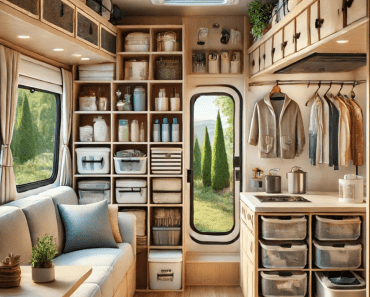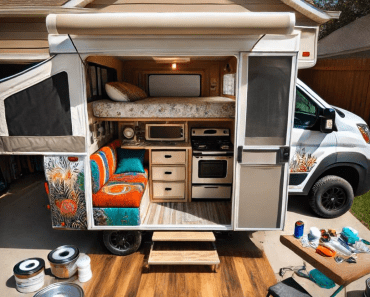Living in a camper offers a unique lifestyle that blends adventure, minimalism, and the freedom to explore new places at your own pace. If you’ve ever dreamed of hitting the open road, camper living might be the perfect choice for you. In this comprehensive guide, we’ll explore every aspect of camper living, from choosing the right camper to embracing a nomadic lifestyle.

Why Choose Camper Living
Camper living isn’t just about traveling; it’s about embracing a lifestyle that prioritizes experiences over possessions. For many, the allure lies in the ability to wake up in a new location every day, surrounded by nature or vibrant cities. This way of life can reduce stress, provide a sense of freedom, and offer endless opportunities for adventure.
Living in a camper also promotes a minimalist lifestyle. With limited space, you learn to prioritize what truly matters, shedding the excess that often clutters a traditional home. This simplicity can lead to a more meaningful and focused way of life, allowing you to connect more deeply with your surroundings and yourself.
Choosing the Right Camper
Selecting the right camper is crucial to your overall experience. There are several types to consider, each with its own benefits and drawbacks.
Travel Trailers
Travel trailers are a popular choice due to their versatility and range of sizes. They can be easily detached from your vehicle, allowing you to explore without having to tow your living space everywhere. Travel trailers come in various lengths, from compact options to luxurious models with multiple rooms.
Motorhomes
Motorhomes combine the vehicle and living space into one unit. This makes setup and travel more convenient, as you don’t need to hitch or unhitch a trailer. Motorhomes come in three classes:
- Class A: The largest and most luxurious, often resembling a bus.
- Class B: Smaller, van-sized options, perfect for solo travelers or couples.
- Class C: A middle ground, offering more space than Class B but more manageable than Class A.
Camper Vans
Camper vans are compact and easy to maneuver, making them ideal for urban exploration. They typically offer the essentials: a bed, a small kitchen, and sometimes a bathroom. Camper vans are perfect for those who prioritize flexibility and mobility over space.
Important Note: When choosing a camper, consider factors like your budget, the size of your traveling party, and the type of destinations you plan to visit.
Preparing for Camper Living
Downsizing Your Belongings
Transitioning to camper living requires significant downsizing. Start by evaluating your possessions and deciding what is essential. Items that don’t serve a purpose in your new lifestyle should be sold, donated, or stored.
Planning Your Route
Before setting off, plan your route carefully. Research campgrounds, RV parks, and boondocking spots along your journey. Having a rough itinerary can help you avoid stress and ensure you always have a safe place to stay.
Budgeting for Life on the Road
Camper living can be cost-effective, but it’s essential to budget wisely. Consider expenses such as:
- Fuel: This will likely be one of your most significant costs.
- Campground Fees: While some sites are free, others charge nightly fees.
- Maintenance: Regular upkeep is crucial to avoid costly repairs.
- Food and Supplies: Plan your meals and shopping to minimize waste and expenses.
Living Comfortably in a Camper
Organizing Your Space
Maximizing the limited space in a camper requires creativity and discipline. Use storage solutions like bins, hooks, and collapsible items to keep your living area tidy. Regularly declutter to maintain a comfortable and functional environment.
Cooking in a Camper
Cooking in a camper can be a delightful experience with the right setup. Equip your kitchen with multi-purpose tools and compact appliances. Plan meals that are simple yet nutritious, and take advantage of outdoor cooking options like portable grills or campfires.
Staying Connected
Staying connected is crucial for work, emergencies, and keeping in touch with loved ones. Invest in a reliable mobile hotspot and consider cell signal boosters for remote areas. Many campgrounds also offer Wi-Fi, but having your own connection ensures you’re always online.
Health and Safety
Prioritize your health and safety by maintaining a well-stocked first aid kit, knowing basic vehicle maintenance, and having an emergency plan. Regularly check your camper’s systems, such as the brakes, tires, and plumbing, to prevent breakdowns or accidents.
Embracing the Camper Lifestyle
Finding Community
One of the joys of camper living is meeting like-minded individuals. Join online forums, social media groups, and attend RV meetups to connect with fellow travelers. Sharing tips, stories, and experiences can enhance your journey and provide a support network.
Exploring Nature
Living in a camper allows you to immerse yourself in nature. Take advantage of your mobility to visit national parks, forests, and scenic byways. Hiking, fishing, and stargazing are just a few activities that can enrich your outdoor experience.
Working on the Road
If you need to work while traveling, consider remote job opportunities or freelance work. Set up a comfortable workspace in your camper and establish a routine that balances work and exploration. Many campers find that working from beautiful locations boosts their creativity and productivity.
Sustainable Camper Living
Embrace eco-friendly practices to minimize your impact on the environment. Use solar panels to generate power, practice waste reduction, and choose biodegradable products. Being mindful of your footprint ensures that the places you love remain pristine for future generations.
Camper Living Tips and Tricks
Packing Essentials
When packing for camper living, focus on versatility and functionality. Essentials include:
- Clothing: Pack according to the climates you’ll encounter, favoring layers and quick-dry fabrics.
- Tools and Repairs: Carry a basic tool kit, spare parts, and repair manuals.
- Outdoor Gear: Chairs, tables, and recreational equipment can enhance your outdoor experience.
- Entertainment: Books, games, and hobbies help pass the time during long drives or bad weather.
Managing Water and Waste
Efficiently managing water and waste is crucial for comfort and sustainability. Learn to conserve water by taking shorter showers and using low-flow fixtures. Regularly empty and clean your waste tanks to prevent odors and maintain hygiene.
Staying Active
Maintaining an active lifestyle is important for physical and mental health. Incorporate activities like hiking, biking, or yoga into your routine. Many campgrounds offer recreational facilities, and outdoor spaces provide ample opportunities for exercise.
Handling Challenges
Camper living comes with its own set of challenges. Weather extremes, mechanical issues, and isolation can be daunting. Approach these challenges with a positive attitude and problem-solving mindset. Remember, every challenge is an opportunity to learn and grow.
Pros and Cons of Camper Living
To help you decide if camper living is right for you, here’s a table outlining the pros and cons:
| Pros | Cons |
|---|---|
| Freedom to travel and explore | Limited living space |
| Minimalist and simple lifestyle | Requires regular maintenance |
| Cost-effective living | Can be isolating |
| Close to nature | Weather-dependent |
| Flexibility to change locations | Internet connectivity challenges |
Important Note
“Camper living is not for everyone, but for those who crave adventure and simplicity, it offers a rewarding and enriching lifestyle.”
Conclusion
Camper living is a journey of discovery, both of the world and of oneself. It offers unparalleled freedom, the opportunity to embrace minimalism, and the chance to create lasting memories. Whether you’re seeking adventure, a simpler way of life, or a new perspective, camper living might be the perfect path for you. Start your journey today and discover the endless possibilities that await on the open road.



